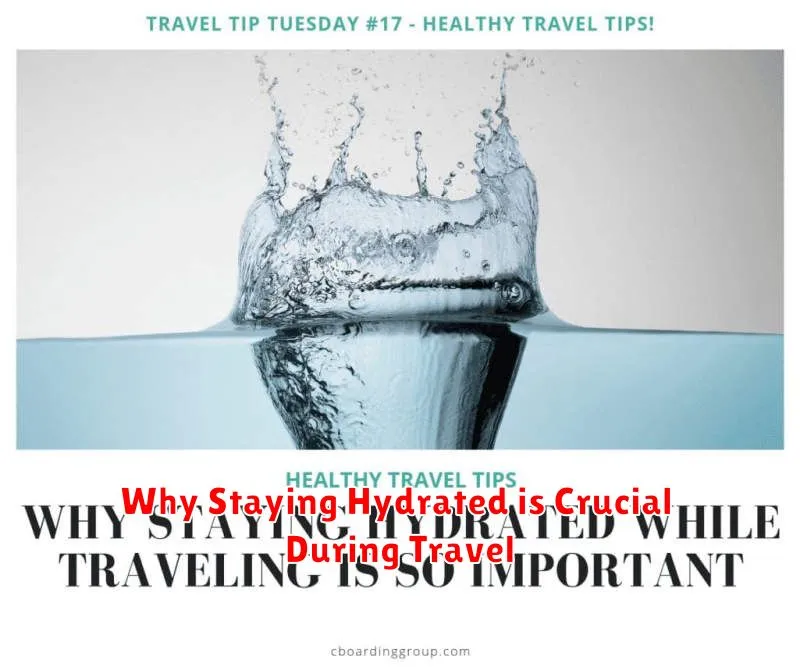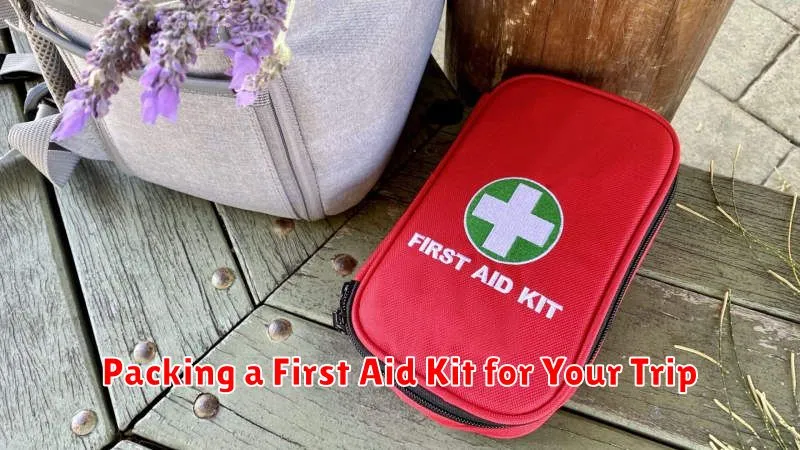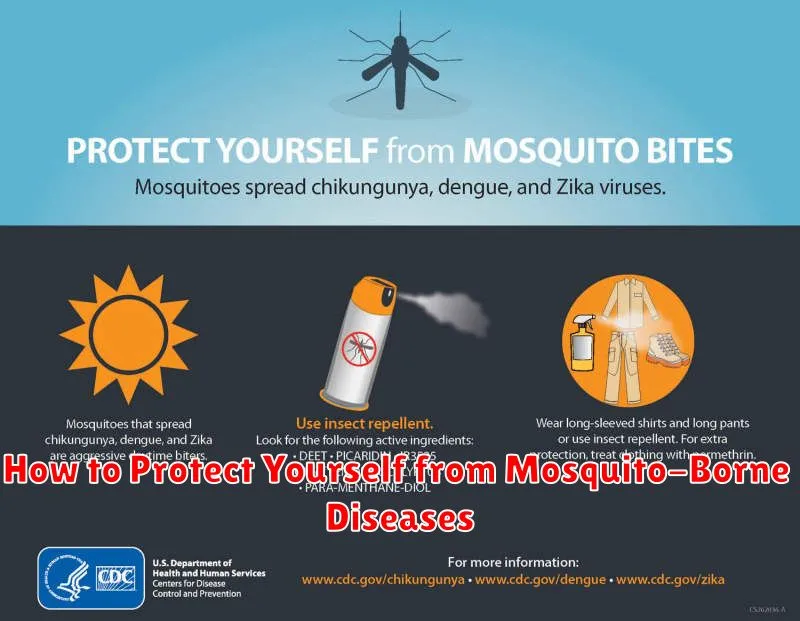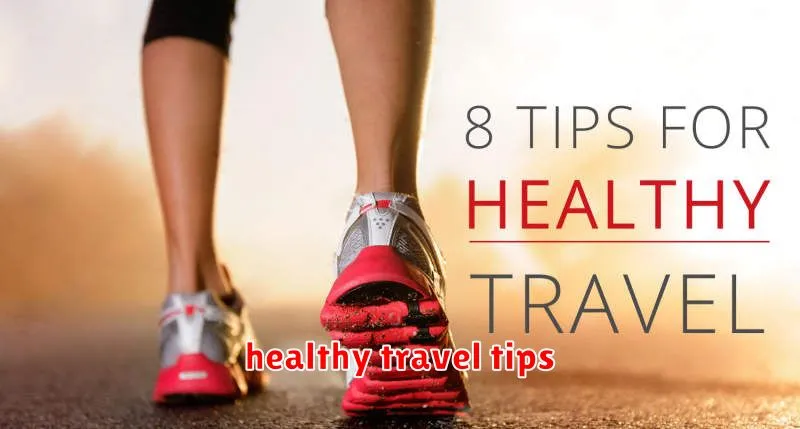So you’re planning an amazing trip, but worried about staying healthy while traveling? Don’t let the fear of travel sickness or food poisoning ruin your adventure! This guide is packed with practical tips and advice on how to maintain your health while exploring new places. We’ll cover everything from pre-trip vaccinations and packing essentials to healthy eating habits on the go and preventing jet lag. Get ready to explore the world without compromising your well-being – let’s make sure your trip is as healthy and happy as it is adventurous!
Why Staying Hydrated is Crucial During Travel

Travel can be dehydrating. Between the dry air in airplanes and the excitement that can lead to forgetting to drink enough water, maintaining proper hydration is crucial for your health while traveling.
Dehydration can lead to several unpleasant travel companions: headaches, fatigue, dizziness, and even more serious complications. These symptoms can significantly impact your enjoyment of your trip and your ability to fully experience your destination.
Staying hydrated helps your body function optimally. It aids in digestion, prevents constipation (a common travel woe), and helps your body regulate its temperature, especially important in hot climates. Proper hydration also boosts your immune system, making you less susceptible to catching illnesses that are often more prevalent in crowded travel environments.
Simple strategies for staying hydrated include carrying a reusable water bottle and refilling it regularly, opting for water over sugary drinks, and being mindful of consuming hydrating foods like fruits and vegetables. Making hydration a priority ensures a healthier and more enjoyable travel experience.
Tips for Managing Jet Lag
Jet lag, that unpleasant feeling of disorientation after a long flight, can significantly impact your trip. Luckily, there are ways to minimize its effects. Preparation is key.
Before your flight, start adjusting your sleep schedule gradually. If you’re traveling east, go to bed earlier; if you’re traveling west, go to bed later. This helps your body begin adjusting to the new time zone proactively.
On the plane, stay hydrated by drinking plenty of water and avoiding alcohol and caffeine. These can dehydrate you and worsen jet lag symptoms. Try to get some sleep, even if it’s just a short nap. Consider using an eye mask and earplugs to block out light and noise.
Upon arrival, expose yourself to sunlight. This helps regulate your body’s natural sleep-wake cycle. Try to stay awake until a reasonable bedtime in your new time zone, even if you’re tired. Stick to your new time zone’s schedule as much as possible, eating and sleeping according to local time.
Avoid long naps during the day; they can disrupt your nighttime sleep. If you need to rest, opt for a short power nap (20-30 minutes). For the first few days, prioritize getting a good night’s sleep to help your body adjust.
Finally, be patient. It takes time for your body to adjust to a new time zone. Listen to your body and allow yourself time to recover from the effects of jet lag.
How to Eat Healthy While on the Road
Traveling often disrupts healthy eating habits. Fast food and convenient options are tempting, but maintaining a healthy diet while on the road is achievable with a little planning.
Pack healthy snacks: Before you leave, stock up on non-perishable items like nuts, seeds, fruit (apples, bananas), granola bars (choose low-sugar options), and protein bars. These will help stave off hunger pangs between meals and prevent impulsive unhealthy choices.
Choose accommodations wisely: Many hotels offer complimentary breakfast options, which can often include healthier choices like yogurt, fruit, and oatmeal. Look for hotels that also provide access to a refrigerator and microwave to store and prepare your own meals.
Plan your meals: Research restaurants near your destinations in advance. Look for restaurants that offer healthy options like salads, grilled fish, or vegetable dishes. Websites and apps like Yelp or HappyCow can help you find healthy eating establishments.
Make smart restaurant choices: When dining out, be mindful of portion sizes and opt for healthier cooking methods like grilling, baking, or steaming. Don’t be afraid to ask for modifications to dishes, such as requesting dressings on the side or extra vegetables.
Stay hydrated: Drinking plenty of water is crucial for overall health, especially when traveling. Carry a reusable water bottle and refill it throughout the day. Avoid sugary drinks like soda and juice.
Listen to your body: Pay attention to your hunger and fullness cues. Don’t force yourself to eat if you’re not hungry, and stop eating when you feel satisfied, not stuffed.
By following these simple tips, you can enjoy your travels while maintaining a healthy and balanced diet. Remember, even small, conscious choices can make a big difference.
Essential Travel Vaccinations and Medications
Planning a trip? Vaccinations and medications are crucial for a healthy journey. Consult your doctor at least 8 weeks before your departure to discuss necessary vaccinations based on your destination and planned activities.
Routine vaccinations, such as measles, mumps, rubella (MMR), and tetanus-diphtheria-pertussis (Tdap), should be up-to-date. Your doctor can advise on necessary travel-specific vaccines, which can include those for typhoid, yellow fever, hepatitis A and B, rabies, and Japanese encephalitis, depending on your destination.
Beyond vaccinations, pack essential medications. This includes any prescription drugs you regularly take, along with over-the-counter remedies for common travel ailments. Consider packing pain relievers (like ibuprofen or acetaminophen), anti-diarrheal medication, antacids, motion sickness medication, and allergy medicine.
Remember to bring a copy of your vaccination records and prescriptions. Carry your medications in their original containers and keep them separate from your checked luggage. It’s also wise to have a list of your medications and allergies in case of emergencies.
Finally, be aware of the local healthcare system at your destination and locate the nearest medical facilities or pharmacies. Being prepared for the unexpected will allow you to focus on enjoying your trip!
Maintaining a Workout Routine While Traveling
Traveling can disrupt even the most dedicated workout routines. Between packed schedules, unfamiliar surroundings, and tempting culinary experiences, sticking to your fitness goals can feel challenging. However, with a little planning and flexibility, you can maintain your fitness level while exploring new places.
Prioritize packing. Bring lightweight workout essentials like resistance bands, a jump rope, or workout clothes that can be easily layered. These items require minimal space and allow for effective workouts in various locations – your hotel room, a park, or even the beach.
Utilize hotel gyms. Many hotels offer fitness centers, even if they are basic. Taking advantage of these amenities, even for a short workout, is far better than doing nothing. Look into the hotel’s amenities before you book if a well-equipped gym is important to you.
Embrace outdoor activities. Traveling provides a unique opportunity to engage in activities you might not typically do at home. Explore the area on foot, rent a bike, or go for a hike. These activities combine sightseeing with physical activity.
Schedule your workouts. Just like any other important appointment, schedule your workouts into your daily itinerary. Treat them as non-negotiable to ensure they happen. Even 20-30 minutes of exercise is far more beneficial than skipping it altogether.
Be flexible and forgiving. Things don’t always go as planned while traveling. If you miss a workout or your routine is disrupted, don’t beat yourself up about it. Just get back on track as soon as possible. The key is consistency, not perfection.
The Importance of Rest Days on Long Trips
Long trips, whether for business or pleasure, can be incredibly taxing on your body and mind. Rest days are crucial for preventing burnout and maintaining your overall health and well-being throughout your journey.
Without scheduled downtime, you risk accumulating fatigue, which can lead to decreased immunity, increased susceptibility to illness, and poor decision-making. This is especially true when you’re navigating unfamiliar environments and time zones.
Rest days allow your body to repair and recover from the physical demands of travel, such as long flights, extensive walking, or strenuous activities. They offer a chance to alleviate muscle soreness, reduce stress, and improve sleep quality.
Consider rest days as an investment in your health. By incorporating them into your itinerary, you’ll not only feel better, but you’ll also be able to fully enjoy your trip and create lasting positive memories instead of being constantly exhausted.
During your rest days, prioritize activities that promote relaxation and rejuvenation. This could involve light exercise, such as a gentle walk, spending time in nature, reading a book, or simply unwinding in your accommodation.
Remember, a well-rested traveler is a happy and healthy traveler. Planning adequate rest days is a key component of a successful and enjoyable long trip.
Packing a First Aid Kit for Your Trip

Staying healthy while traveling relies heavily on preparedness, and a well-stocked first-aid kit is your first line of defense. Don’t rely on finding what you need at your destination; pack essential supplies to handle minor injuries and ailments.
Your kit should include pain relievers (ibuprofen or acetaminophen), antihistamines for allergies, anti-diarrheal medication, and antacids for upset stomachs. Remember band-aids in various sizes, antibiotic ointment, antiseptic wipes, and tweezers for removing splinters or ticks.
Consider including motion sickness medication if prone to car or sea sickness. Medications for any pre-existing conditions are crucial; ensure you have enough for the duration of your trip plus extra. Don’t forget any personal medications you require regularly.
Pack your first-aid kit in a waterproof, durable container for protection. Keep it readily accessible throughout your journey. While this kit handles minor issues, remember that serious medical emergencies require professional medical attention. Always have travel insurance and know the location of the nearest medical facility.
Tips for Avoiding Traveler’s Diarrhea
Traveler’s diarrhea is a common ailment, but thankfully, preventable. The key is to be cautious about what you eat and drink.
Hydration is crucial. Drink only bottled water or water that has been boiled. Avoid ice, as it may have been made with contaminated water.
Food safety is paramount. Stick to well-cooked foods that are hot and served steaming. Avoid raw or undercooked meat, seafood, and eggs. Choose foods that are peeled or cooked yourself.
Hand hygiene is essential. Wash your hands frequently with soap and water, especially before eating and after using the restroom. Carry hand sanitizer with at least 60% alcohol if soap and water aren’t readily available.
Avoid risky foods and drinks. Steer clear of street food from vendors with questionable hygiene practices. Be wary of unpasteurized dairy products and raw fruits and vegetables that haven’t been thoroughly washed.
Consider speaking to your doctor about prophylactic antibiotics before your trip. They can provide guidance on whether this is appropriate for your travel plans and health status.
By following these simple yet effective precautions, you can significantly reduce your risk of experiencing traveler’s diarrhea and enjoy a healthier trip.
How to Protect Yourself from Mosquito-Borne Diseases

Mosquitoes are a significant threat to travelers, capable of transmitting diseases like malaria, dengue fever, Zika virus, and West Nile virus. Protecting yourself is crucial for a healthy trip.
Prevention is key. Start by checking the Centers for Disease Control and Prevention (CDC) website for travel advisories and recommended vaccinations for your destination. Many mosquito-borne illnesses can be prevented with appropriate vaccines.
Repellents are your next line of defense. Choose a repellent containing DEET, picaridin, IR3535, or oil of lemon eucalyptus. Apply it liberally to exposed skin, following the product instructions carefully. Reapply frequently, especially after swimming or sweating.
Clothing plays a vital role. Wear long-sleeved shirts, long pants, and socks, especially during dawn and dusk when mosquitoes are most active. Light-colored clothing can also help reduce mosquito attraction.
Mosquito netting can provide an additional layer of protection, especially when sleeping. Ensure your accommodation has screens on windows and doors, or bring your own portable net. Consider using a mosquito net over your bed, especially in areas with high mosquito populations.
Finally, be mindful of your surroundings. Avoid stagnant water where mosquitoes breed, and use insect repellent consistently. Staying vigilant is crucial to minimizing your risk of mosquito-borne illnesses.
Staying Safe While Trying New Foods
Trying new foods is a huge part of the travel experience, but it’s important to do so safely. Foodborne illnesses can quickly derail your trip, so take precautions.
First, choose reputable establishments. Busy restaurants are often a good sign of fresh ingredients and quick turnover. Avoid street food that looks questionable or isn’t being handled hygienically.
Wash your hands frequently, especially before eating. Carry hand sanitizer if soap and water aren’t readily available. If you’re unsure about the water quality, stick to bottled water for drinking and brushing your teeth.
Be cautious with raw or undercooked foods, including meat, seafood, and eggs. Opt for well-cooked dishes whenever possible. Also be mindful of cross-contamination; ensure your utensils and plates are clean.
Listen to your body. If you experience any symptoms of food poisoning (nausea, vomiting, diarrhea), seek medical attention immediately. Stay hydrated and rest to recover quickly.
Finally, consider packing some familiar snacks. Having a few non-perishable items on hand can provide comfort and a backup plan if you’re unsure about the local food options. Remember, a little preparation can go a long way towards a safe and enjoyable culinary adventure!

